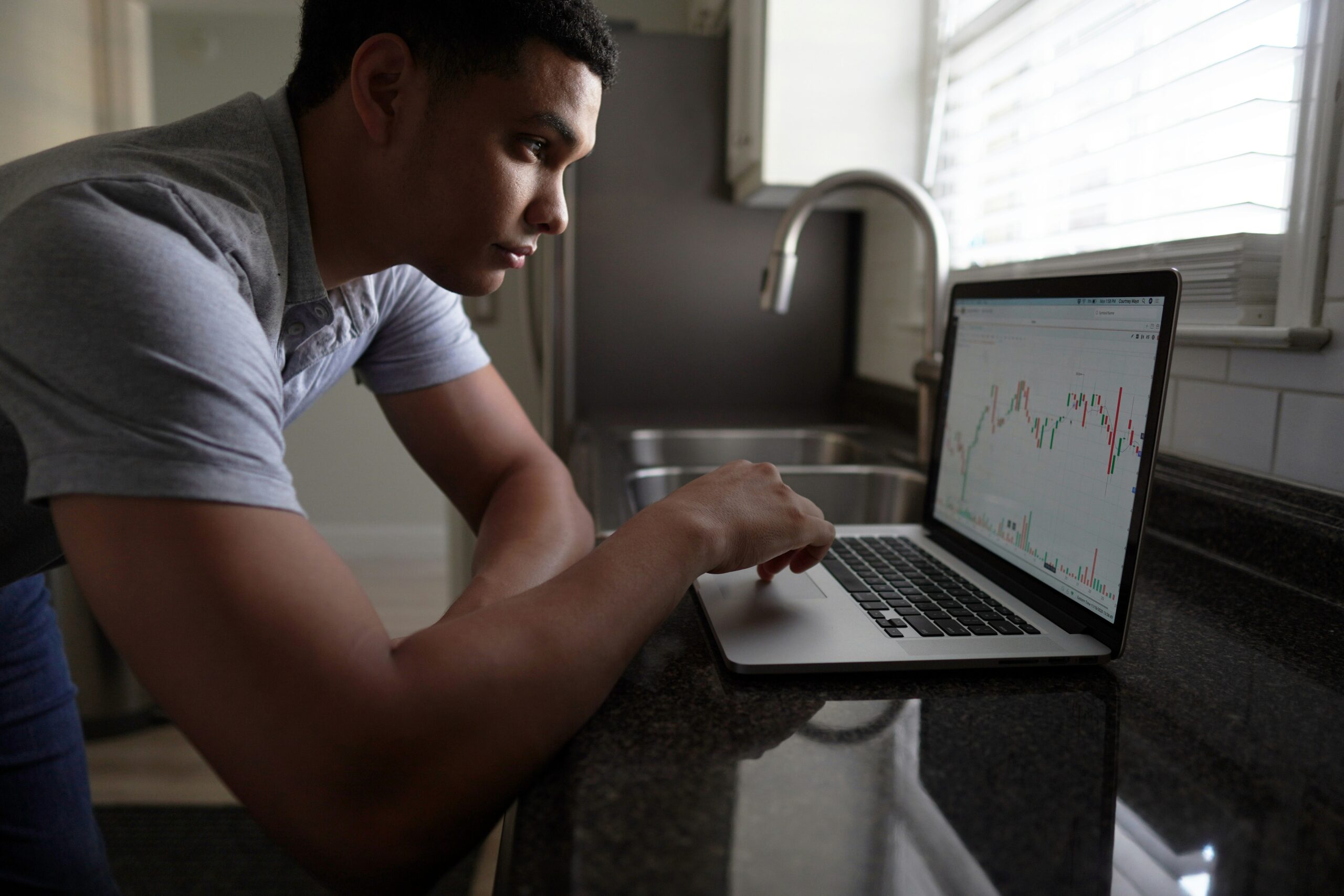How Emotions Impact Your Trading Decisions
When it comes to trading, most people think it’s all about numbers, charts, and strategies. While those are essential, there’s another huge factor that often flies under the radar—your emotions. Trading is a psychological game as much as it is a technical one. Whether it’s excitement after a big win or fear after a loss, emotions can easily cloud your judgment and impact your decisions. The key to becoming a successful trader is understanding how emotions affect your trading and learning how to keep them in check.
Let’s explore how emotions like fear, greed, and overconfidence can creep into your trades and what you can do to handle them better.
The Fear Factor: Trading on the Defensive
One of the most common emotions traders face is fear. Fear of losing money, fear of making the wrong move, fear of missing out on a profitable trade—it’s all part of the trading journey. When fear takes over, you might hesitate to pull the trigger on a good opportunity or panic-sell at the first sign of a market dip.
Fear can also lead to overcautious trading, where you’re so afraid of losing that you never give yourself a chance to win. You might enter smaller positions than you should or exit trades too early, cutting your profits short. Fearful traders often second-guess their analysis, doubting whether they should enter or exit a position, which leads to missed opportunities.
To overcome fear, you need to rely on your trading plan and stick to it. Trusting the strategy you’ve laid out beforehand can prevent emotional decisions in the heat of the moment. By setting clear entry and exit points, you’ll have a road map to follow, making it easier to stay calm even when the market gets shaky.
Greed: The Temptation to Go Big or Go Home
If fear makes you overly cautious, greed has the opposite effect—it makes you overly aggressive. Greed often kicks in after a winning streak. You start thinking you’re unstoppable and want to maximize every trade, which can lead to overleveraging and overtrading. This can spell disaster if the market turns against you.
Greed drives traders to chase profits and make impulsive decisions, like holding onto a winning trade for too long or entering a risky position without proper analysis. You start thinking, “just a little more,” only to watch the market reverse and take back your gains.
The best way to keep greed in check is to set realistic profit targets and stick to them. Know when to take profits and when to walk away. Remember, the market doesn’t care about your profit goals—it moves according to its own rules. By keeping your expectations in line with your strategy, you’ll avoid falling into the greed trap.
The Emotional High: Overconfidence After a Win
There’s nothing quite like the feeling of a successful trade. It’s a rush, a burst of dopamine that can make you feel like you’ve mastered the market. But that high can quickly lead to overconfidence, which is dangerous in trading. Overconfidence makes you believe that every trade will be a winner and that you can’t go wrong. As a result, you start taking bigger risks without proper analysis, and that’s where things often go sideways.
Overconfident traders are more likely to ignore their risk management rules, placing larger trades than usual or skipping important signals that suggest caution. It’s easy to think you’ve cracked the code after a few wins, but the market has a way of humbling overconfident traders quickly.
To avoid overconfidence, keep yourself grounded by following your trading plan consistently. Celebrate your wins, but always remember that losses are part of the game too. It’s essential to approach each trade with the same level of discipline and preparation, no matter how well you’ve been doing.
Emotional Trading: The Roller Coaster You Don’t Want
Let’s be honest—trading can be an emotional roller coaster. The ups and downs of the market can take a toll, making it hard to stay level-headed. When emotions are in control, you’re no longer trading based on strategy; you’re trading based on how you feel. This is a surefire way to make mistakes.
Traders who let their emotions run wild often end up revenge trading—a dangerous habit where you try to recover losses by making riskier trades. This usually leads to even bigger losses, as emotional decisions are rarely rational. You might also find yourself overtrading, entering too many trades out of excitement or frustration, without proper analysis.
The key to avoiding emotional trading is learning to detach yourself from the outcome of each trade. Understand that wins and losses are part of the process, and neither defines your long-term success. By keeping a calm, focused mindset, you’ll be able to make smarter, more informed decisions.
Practical Tips for Managing Your Emotions
So, how do you keep your emotions in check when trading? One of the best ways is to have a solid trading plan in place. A well-thought-out plan that outlines your entry and exit points, risk tolerance, and profit targets will help you make decisions based on logic, not feelings.
It’s also important to take regular breaks from trading, especially if you find yourself feeling overwhelmed or frustrated. Walking away from the screen for a bit can give you the mental clarity you need to come back with a fresh perspective.
Additionally, make sure you have a risk management strategy in place. This means setting stop-loss orders and not risking more than you can afford to lose on any single trade. When you have safeguards like these, you can trade with confidence, knowing you’ve taken steps to protect your capital.
The Importance of a Trading Plan and Discipline
If you’re diving into the world of forex trading, you’ve probably heard about the importance of having a trading plan. But what exactly is it, and why does everyone keep talking about it? Well, imagine trying to sail a boat without a map. You might get lucky and end up at your destination, but the chances are you’ll drift aimlessly. The same goes for trading without a plan. It’s all about setting a clear path so you don’t get lost in the fast-moving currents of the market.
Creating a trading plan helps you stay focused, stick to your strategy, and avoid impulsive decisions driven by emotions. But equally important is the discipline to follow that plan—even when the market tempts you to stray. Let’s dive deeper into why having a trading plan and maintaining discipline are absolute musts for long-term success.
What Exactly is a Trading Plan?
In simple terms, a trading plan is your roadmap for how you approach the market. It’s not just about where you’ll buy and sell; it’s about outlining your goals, risk tolerance, and the strategy you’ll use. Think of it as your trading rulebook that guides your decisions and keeps you accountable. Without it, you’re just throwing darts and hoping to hit a bullseye.
A good trading plan will cover everything from the types of trades you’ll take to the maximum amount you’re willing to lose on a single trade. It also includes your strategy for entering and exiting positions, your risk management techniques, and the indicators or tools you rely on. Having all of this laid out ensures that you’re not making split-second decisions based on emotions but rather following a well-thought-out strategy.
Sticking to the Plan: Easier Said Than Done
Let’s be honest—sticking to a plan is often harder than creating it. It’s easy to let emotions take over, especially when the market’s moving fast, and you’re feeling pressure. Maybe you want to chase a hot trade that looks like a quick win, or you’re tempted to hold on just a little longer in the hope of more profit. This is where discipline comes in.
Discipline in trading means following your plan no matter what the market throws at you. It’s about sticking to your rules even when your gut is telling you to take a risk. For example, if your plan says to exit a trade at a certain price, do it—don’t let the excitement of potential extra profit make you hang on too long. Similarly, if you’ve hit your loss limit for the day, it’s time to step away from the screen and come back with a clear head tomorrow. It’s tough, but this level of discipline separates successful traders from those who burn out.
Why Discipline is Your Best Trading Friend
You’ve heard the saying, “Discipline equals freedom,” right? Well, in trading, it’s spot on. By following your trading plan and maintaining discipline, you give yourself the freedom to trade consistently without the stress of emotional decisions. It removes the guesswork and keeps you from making knee-jerk reactions in the heat of the moment. This leads to more consistent results over time and helps protect your trading capital.
When you’re disciplined, you’re also able to manage your risk more effectively. This means you won’t blow your account on one bad trade or let a losing streak get out of hand. With risk management in place, like setting stop-losses and only risking a small percentage of your account on each trade, you’re more likely to survive the inevitable ups and downs of the market. Discipline prevents you from going all-in on a hunch or doubling down to make up for a loss, both of which are common ways traders end up in trouble.
Common Pitfalls When You Stray From the Plan
So, what happens if you don’t stick to your plan? Let’s face it—going off-script usually doesn’t end well. Without discipline, it’s easy to fall into the trap of overtrading, where you’re making too many trades out of excitement or frustration. Overtrading can lead to increased transaction costs, poor trade execution, and eventually, draining your account faster than you realize.
Another common mistake is revenge trading. You know the feeling—after a loss, you’re tempted to jump into another trade to “win back” what you lost. But acting out of frustration rarely leads to good outcomes. More often than not, you end up chasing the market, taking risks you wouldn’t normally take, and losing even more. Revenge trading is a direct result of not following your plan and letting emotions dictate your actions.
Finally, traders who don’t follow a plan are more likely to let losses run. Without a predetermined exit strategy, it’s easy to hold onto a losing trade, hoping the market will turn around. Instead of cutting your losses and moving on, you end up watching the loss grow and eating into your capital. A trading plan prevents this by having clear exit points, so you’re never left hanging in the balance.
How to Build a Plan You Can Stick To
If you don’t already have a trading plan, now’s the time to create one. Start by defining your trading goals. Are you looking for long-term growth or short-term gains? Once you know your goals, you can build a strategy around them.
Next, identify your risk tolerance. How much are you willing to lose on any single trade? Most traders stick to the 1-2% rule, meaning they only risk 1-2% of their trading capital on each trade. This way, even a series of losses won’t wipe out your account.
Include clear entry and exit rules in your plan. Know exactly when you’ll enter a trade and what conditions need to be met. Also, have a clear strategy for when you’ll exit, whether that’s at a profit target or a stop-loss level. The more specific your plan, the easier it will be to follow.
Discipline Takes Practice, But It’s Worth It
Here’s the deal: no one is born a disciplined trader. It’s a skill that takes practice, patience, and a whole lot of self-control. The market is unpredictable, and emotions are a natural response. However, when you stick to your plan and stay disciplined, you take back control over your trades. It’s not always easy, but with time and experience, it becomes second nature.
The more you practice discipline, the more confident you’ll become in your ability to navigate the market. You’ll stop reacting to every little price movement and start executing trades with purpose. In the long run, this is what separates winning traders from those who struggle.
Recognizing Overconfidence in Winning Streaks
It feels great to be on a winning streak, doesn’t it? You’re on top of the world, and every trade you touch seems to turn to gold. But here’s the thing—winning streaks can sometimes be deceptive. They give you a confidence boost (which is awesome), but too much confidence can cloud your judgment. When you start thinking you can’t lose, that’s when things can get tricky. Overconfidence is like a sneaky guest that shows up uninvited, and if you’re not careful, it can derail your trading.
Let’s dive into how you can recognize when that winning streak confidence crosses the line into overconfidence—and how to keep it in check before it throws you off course.
The Subtle Signs of Overconfidence
Winning streaks can make you feel invincible, and that’s where the danger lies. Overconfidence doesn’t always announce itself loudly—it often sneaks in gradually. One of the first signs is when you start to bend the rules of your trading strategy. Maybe you’ve had a few solid wins, and you start thinking, “I don’t need to stick to my plan as strictly anymore.” This is a red flag.
Another sign is when you start taking bigger risks than usual. You might begin increasing your position sizes or going into trades without as much analysis because, hey, everything’s been going your way, right? But those bigger risks can turn into bigger losses if the market decides to turn against you.
Also, if you find yourself thinking, “I’ve figured this market out,” be cautious. The forex market is unpredictable, and assuming you have it mastered can lead to reckless decisions. It’s essential to stay grounded and remember that each trade comes with its own risks—regardless of how many wins you’ve had in a row.
The Temptation to Go All-In
Overconfidence has a way of tempting you to go all-in on a single trade or take on more trades than you normally would. You start feeling like every move you make is a winner, so why not go big? This kind of thinking is dangerous because it can lead you to ignore the very thing that got you those wins in the first place—your discipline and strategy.
If you’ve been increasing your trade sizes or opening multiple positions at once without carefully analyzing the market, it’s time to take a step back. Overtrading is a common pitfall when overconfidence creeps in. While it’s great to feel optimistic, trading is still a numbers game, and the market doesn’t care about your winning streak. Stick to your risk management plan and avoid putting all your capital on the line just because things have been going well.
One way to combat the urge to go all-in is to remind yourself that losing streaks are just as likely as winning streaks. By keeping your trades consistent and sticking to your original plan, you’ll be better prepared for any market shift. No streak lasts forever, and when the tide turns, you don’t want to be overexposed.
How Overconfidence Clouds Your Judgment
Another sneaky side effect of overconfidence is that it can cloud your judgment. When you’re riding high on a winning streak, you might start to ignore important signals or dismiss market conditions that would normally give you pause. For example, if you’re typically cautious about news events or market volatility, overconfidence might push you to trade right through them, thinking you’ll come out on top no matter what.
This is when emotional trading starts to creep in. Instead of sticking to your logical, well-thought-out trading plan, you begin making decisions based on feelings of excitement or invincibility. That’s a slippery slope. When emotions are running the show, you’re more likely to make rash decisions that can cost you money.
The best way to keep your judgment clear is to remain objective. Winning streak or not, take the time to analyze each trade carefully. Stick to your pre-determined entry and exit points, and don’t let the euphoria of recent wins cause you to overlook potential risks. It’s important to remember that each trade is its own unique scenario and should be treated as such.
Bringing Yourself Back to Earth
So, how do you bring yourself back to earth when you’re flying high on a winning streak? The key is to stay humble and disciplined. Recognize that just because you’ve had a few great trades doesn’t mean you’ve cracked the code to the market. The market is always evolving, and no one—no matter how skilled—can predict it perfectly.
A practical way to ground yourself is to review your trading plan regularly. Go over your rules for entering and exiting trades, and make sure you’re sticking to them. If you’ve started deviating from your plan, it’s time to course-correct before overconfidence gets the better of you.
Another helpful tactic is to take a small break after a winning streak. Give yourself time to cool off and reassess your approach with a clear head. Taking a day or two off from trading can help reset your mindset and ensure that when you come back, you’re trading with logic rather than emotion.
Strategies for Overcoming Fear of Losses
If there’s one thing every trader faces at some point, it’s the fear of losses. No one likes losing money—especially in the fast-paced world of forex trading. But here’s the catch: losses are part of the game. They happen to everyone, from the newbie traders to the seasoned pros. The good news? There are ways to manage that fear and stop it from holding you back. So, let’s break down some simple strategies to help you overcome the fear of losses and approach trading with more confidence and less stress.
Understand That Losses Are Inevitable
The first step in overcoming the fear of losses is accepting that losses are inevitable. No one, not even the best traders, win every trade. The forex market is unpredictable, and even the most well-planned strategies sometimes hit a snag. What separates successful traders from those who give up is how they handle losses.
Instead of seeing a loss as a failure, think of it as part of the learning process. Every loss teaches you something valuable—whether it’s about market conditions, your strategy, or your emotions. By embracing the fact that losses will happen, you can start viewing them as opportunities to improve rather than roadblocks.
Focus on the Bigger Picture
One of the easiest ways to manage the fear of losses is by shifting your focus to the bigger picture. In trading, it’s important to remember that a single loss doesn’t define your success. What really matters is your overall performance over time. If your wins outweigh your losses in the long run, you’re on the right track.
Instead of getting caught up in the emotions of a losing trade, step back and evaluate your trading results as a whole. Look at your win-to-loss ratio and focus on improving it steadily. By taking this approach, you’ll find that individual losses don’t sting as much, because you know they’re just part of a bigger plan for success.
Use Proper Risk Management
Here’s a powerful tool to help you reduce your fear of losses: risk management. When you know exactly how much you’re willing to risk on each trade, you take a lot of the fear out of the equation. Why? Because you’ve already accepted that if things don’t go your way, you won’t lose more than you’re comfortable with.
A popular rule of thumb is to only risk 1-2% of your account on any single trade. This way, even if the trade doesn’t work out, your account won’t take a big hit. By setting stop-loss orders and sticking to your risk tolerance, you can trade with more confidence, knowing that you’re protecting your capital. Proper risk management won’t just help you overcome your fear—it will also ensure that you’re trading in a sustainable way.
Focus on the Process, Not the Outcome
Another great way to overcome the fear of losses is to focus on the process rather than the outcome. Trading isn’t about winning every single trade—it’s about consistently following a solid strategy. When you’re too focused on the outcome (i.e., winning or losing), you’re more likely to make emotional decisions that lead to mistakes.
Instead, try to shift your mindset toward the process of trading. Did you follow your strategy? Did you stick to your risk management rules? If the answer is yes, then consider the trade a success, even if it resulted in a loss. By focusing on what you can control—like your preparation and decision-making—you’ll start to feel more confident and less anxious about potential losses.
Reframe Your Thinking
One of the most effective ways to deal with fear is to reframe your thinking. Instead of seeing losses as something to be afraid of, view them as a natural part of trading that can be managed. Remember, it’s not about avoiding losses entirely (because that’s impossible), but about controlling how much you lose and learning from each experience.
Start seeing yourself as a risk manager rather than just a trader. Your job isn’t to win every trade—it’s to manage risk in a way that allows you to stay in the game over the long haul. With this mindset, losses become less intimidating, and you can approach each trade with a clear head.
Practice Makes Perfect
Overcoming the fear of losses doesn’t happen overnight. It takes time, experience, and a whole lot of practice. The more you trade, the more comfortable you’ll become with the ups and downs of the market. As you build experience, you’ll start to see losses as just another part of the process, rather than something to be feared.
One way to build this confidence is by using a demo account. A demo account lets you practice trading in real market conditions, but without the pressure of risking actual money. This is a great way to build your skills and test your strategies without the emotional burden of losing money. As you become more comfortable with your trading plan, you’ll find that your fear of losses starts to fade.
Stay Calm and Stick to Your Plan
Fear often leads traders to make rash decisions, like closing a trade too early or avoiding potentially profitable opportunities. The key to overcoming this is to stay calm and stick to your plan. If you’ve done your analysis and have a solid strategy, trust it.
When you feel fear creeping in, take a deep breath and remind yourself that you’ve prepared for this. You’ve set your stop-loss levels, you’ve managed your risk, and you’ve followed your plan. Now, it’s time to let the trade play out without letting fear dictate your actions.




